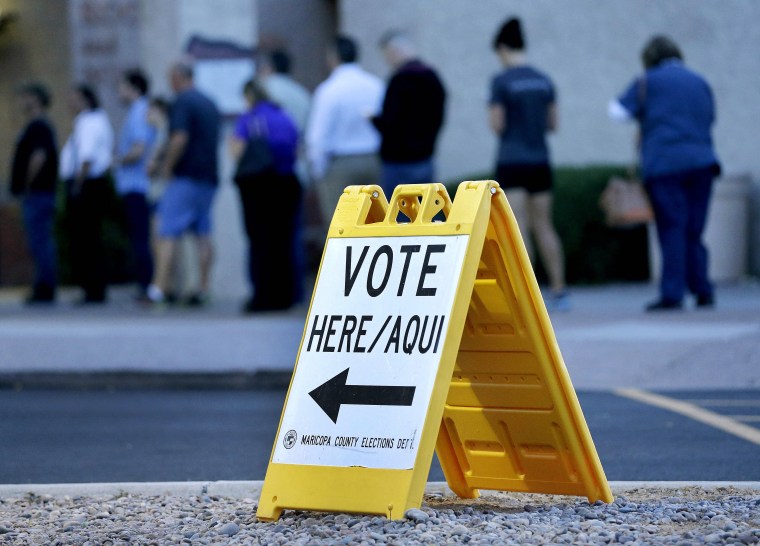Bernie Sanders is forging westward in the Democratic presidential race having whittled Hillary Clinton's delegate lead slightly, but with a loss in Arizona, a state with a hefty Latino electorate, not yet allowing him to declare he's turned around his performance with minority voters.
Sanders resoundingly won in Utah with 80 percent of the vote and Idaho with about 78 percent in Tuesday's caucuses, while Hillary Clinton was the projected winner in Arizona's primary with 58 percent.
Exit polling data was not available Wednesday afternoon, but the win was considered a score for Clinton in the competition for the Latino vote. The state's voting eligible population is 22 percent Latino, about double of Utah's, 8 percent and Idaho's, 7 percent.
Related: Clinton, Sanders in Primary Showdown for Latino Vote
Clinton has done well in the Latino heavy states of Florida, Texas and Arizona, while Sanders won in Colorado, edged out Clinton in Illinois, 50 percent to 49 percent and was competitive in Nevada (exit polls showed he won the Hispanic vote but that has been disputed.)
Still on the horizon are the April 19 primary of New York, where 13 percent of eligible voters are Latino and the June 7 primaries of New Mexico, with an electorate that is 40 percent Latino and California, with an electorate that is 28 percent Latino, according to Pew Research Center.
While Clinton has been winning states with significant African American voting populations, Sanders has made some inroads with Latinos. But this Saturday’s primaries will feature Latino electorates about the size of the states that Sanders won on Tuesday.
Alaska’s voting population is 5.4 percent Latino, Hawaii’s is 5.4 percent, Washington’s is 6.7 percent and Hawaii’s is 8.3 percent. The Asian American voting-age population in those three states is about 5 percent each. The three states are not in the top 25 WalletHub rankings of states by black political engagement.
The Clinton campaign is feeling buoyed by the win regarding her support from Latino voters.
"What we saw in Arizona and have seen across the country is that Hillary Clinton's message continues to resonate with Latino voters," said Xochitl Hinojosa, a Clinton campaign spokeswoman.
Clinton had already moved on to Washington Tuesday and made quick mention of her win in Arizona before moving on to attacking Donald Trump, who leads the field in the Republican race.
She did acknowledge who came through for her on her Twitter account.
There were complaints largely from the Sanders supporters and its campaign about the long lines for voting caused by Arizona's decision to close 140 of 200 polling places for this election and its failure to anticipate the surge in turnout. The state said reducing the polling locations saved money and was done because of the increase in use of mail-in ballots.
Arizona is one of the states that was covered by Section 5 of the Voting Rights Act before that section was invalidated by the U.S. Supreme Court. The section required states with a history of racial discrimination to get permission to make election changes such as creating new precincts or reducing polling places such as Arizona did.
On Wednesday, Rep. Raul Grijalva, D-Ariz., sent out a call to voters for accounts of problems they experienced voting.
“The impacts of undoing the Voting Rights Act have been dramatically revealed in Arizona, and the result is disenfranchisement plain and clear," Grijalva said in a statement. "Gutting polling locations to save a buck has dismantled a fair election process.”
Political attention, however, already has turned to Wisconsin and its 96 delegates to be proportionally awarded in the state's April 5 Democratic primary.
Sanders needs to win 60 percent of delegates in upcoming races to take over Clinton, leading some to say its time for him to step down.
But Christian Ucles, who has worked for the Texas and the Minnesota Democratic parties and progressive non-profit groups, said it is unfair at this time for Democrats to call for Sanders to step down.
“As long as he is able to maintain a campaign infrastructure and raise the amount of money he is, he should remain. He’s winning states. He’s not like Marco Rubio (where) he keeps losing and losing and losing,” said Ucles, political director for the League of United Latin American Citizens of Iowa.
Separate from that position, because LULAC is non-profit, Ucles is backing Clinton.
Sanders essentially said he wasn’t going anywhere anytime soon.
“Why in God’s name would we not give the people of New York state and California the right to determine and voice their opinion as to who the Democratic nominee would be?” he told reporters in California Wednesday.
“If we believe as I do, that you defeat Republicans when there is a large voter turnout and Republicans win when there is a small voter turnout, man, it is absolutely essential that we contest every state in this country,” he said.
If Sanders could keep Clinton from getting a majority of delegates, that could throw the nomination to superdelegates, elected officials who can back who they wish. Clinton has many of them backing her now, but Sanders could insist they vote the way their state voted, Ucles said.
José Parra, a Democratic strategist, agreed that Sanders’ fundraising has been key in allowing him to remain in the race.
“If I them at this stage of the race, I would be thinking about how can I shape the party platform and thinking of Clinton campaign and which of my ideas can I get them to incorporate,” said Parra, founder of ProsperoLatino and a former adviser to Senate Minority Leader Harry Reid, D-Nev.
“She has to incorporate them if she wants to get his votes,” Parra said.

